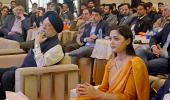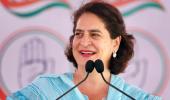The big surprise is that Narendra Modi, the greatest conjurer in our national politics, has not yet presented a theme to this election, observes Shekhar Gupta.

We are now at about the halfway point in the Lok Sabha election campaign and what stands out is -- and I say so with some trepidation -- how little stands out.
Trepidation because the nutgraf of the argument is the frontrunner's inability to define this campaign so far.
Since Narendra Modi and his Bharatiya Janata Party first rose, say from 2012 onwards, they have defined the terms of competitive politics in India.
In 2014, it was the call for achchhe din (better times) for all and a '56-inch chest' and laal aankh (angry red eyes) for enemies, namely, Pakistan and China.
In 2019, it was a clarion call on national security, and a changed approach to it, defined as 'ghus ke maarenge (will kill the terrorists/enemies inside their homes)'.
For 2024, a theme has yet to emerge for the BJP. China is totally missing, and Pakistan mostly so.
None of this distracts from the theme that the party remains the frontrunner by some distance. That is why its diffidence in settling some consistent and durable terms of engagement in this contest is intriguing.
This might indeed be the reason why voting percentages have been lower this time. And the summer hasn't even fully begun yet.
Or could it be that they see the lack of a contest, which makes it unexciting, like the anticipation of a one-sided cricket match between two vastly unequal rivals?
When the result is so easy and safe to anticipate, why bother going out to vote?
If you speak with people from the BJP and Rashtriya Swayamsevak Sangh, and Modi government supporters in general, as I did over some travels in Bengaluru and around , this apprehension is widely expressed.

Anybody who has followed Indian elections over a length of time, however, will tell you that this is almost never the case.
In fact, voter enthusiasm -- the excitement on the street -- is often the most in 'wave' elections.
There is a sense of anticipation, a better future, sometimes even vengeance. For all these reasons, 2024 is turning out to be an unexpectedly themeless election.
The big surprise is that Narendra Modi, the greatest conjurer in our national politics, has not yet presented a theme to this election. Or a thread that can run through phases one to seven.
Already, until the conclusion of phase two on April 26, he and his party had presented new themes and moved on -- some not lasting even a week in the campaign.
The extent to which the BJP campaign has been defined by the Opposition and the issues set by the Congress is also remarkable.
It is generally an unlikely thing for a deeply entrenched incumbent and frontrunner to keep reacting to the challenger.
This BJP has worked hard to earn an entirely deserved reputation as a party constantly in campaign mode.
Campaign 2024, therefore, began on the theme of Narendra Modi leading India to a much higher global stature than anybody in the past -- the unspoken comparison was with Jawaharlal Nehru and Indira Gandhi.
The pathway to it began with the gates of Bharat Mandapam, which hosted the G20 summit. The entire show was choreographed to project Modi as the new leader of the world, and it was acknowledged as being so by the heads of the most powerful States.
Of course, this set piece received a setback with the failure of the plan to collect the Quad leadership in New Delhi around Republic Day, and even more so with US President Joe Biden turning down the invitation to be chief guest.
Now, what role the Nijjar-Pannun issue played here, or what kind of shadow it set on the G20, especially between India and the Anglosphere, we don't know.
What can reasonably be concluded is that this momentum of rising global stature was, if not broken, delivered a rude wobble.
The other plank built during the same pre-election weeks was a large appeal to the woman voter, especially with the hurried passing of the law for women's reservation in elected bodies.
The law, with no deadline for implementation, will await the next Census and delimitation -- and for all we know, it may miss 2029.
Again, it doesn't feature prominently in any of the BJP's campaign talk. In fact, the party's women candidates in this election are just about one in six, or 16 per cent.
The Ram Mandir was consecrated in January, again timed for the elections. And yet, check the last 100 speeches of the top 20 leaders of the BJP across states and see where it prominently features, and with how much emphasis.
It only popped up on your TV screens as suggestions emerged that Rahul and Priyanka Gandhi might visit the temple.
Yet another plank was cut and installed with great enthusiasm weeks before the elections were announced, with the award of the Bharat Ratna to two of the most prominent backward-caste/rural underclass leaders in our history: Charan Singh and Karpoori Thakur.
This was the plank of social justice. We haven't heard much about it since then. For sure, the first created the justification for Charan Singh's grandson to leave the INDIA bloc and join the National Democratic Alliance instead.
If you lean back and see the state of the campaign right now, it is defined by the challenger, although probably even the Congress people might be surprised by that description.
In recent weeks, both parties have released their manifestos.
You can note how consistently the prime minister mentions the Congress manifesto, raising questions and fears over it, and how subdued he and his key leaders are in their references to their party's own manifesto.
Similarly, Rahul Gandhi's April 6 speech at the manifesto release in Hyderabad, where he promised a survey of 'institutions, society and wealth', followed by a revolutionary process of distributing it fairly (he didn't use that word, but the implication is clear) among the '90 per cent' left out, has defined Modi's campaign since.
Of course, he has taken the fears to ordinary women losing their mangalsutra and 'stridhan', as the 'Congress' will loot them in their lives and after.
The latest came after Sam Pitroda lit the inheritance tax fire. Are these fears justified or not is an academic point. Unless you think, midway in this campaign, that the Congress party has a realistic chance of coming to power.
Most Congress people and their Opposition allies would tell you on the sidelines that their most realistic target is to hold Modi below that 272 mark.
That's why Modi's approach to this election, despite the odds favouring him so heavily, is intriguing.
He's setting it up in terms of fears of the Congress returning to power, rather than his 10-year track record, and the promise of Viksit Bharat in 2047.
By special arrangement with ThePrint
Feature Presentation: Ashish Narsale/Rediff.com












 © 2025
© 2025